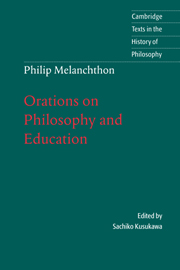Book contents
- Frontmatter
- Contents
- Acknowledgements
- Introduction
- Chronology
- Further reading
- Note on the text
- The scope of education
- The arts course
- 4 On the study of languages
- 5 Preface to Homer
- 6 On the usefulness of fables
- 7 Praise of eloquence
- 8 Preface to Cicero's On Duties
- 9 Dedicatory letter to the Questions on Dialectics
- 10 Preface to arithemetic
- 11 Preface to geometry
- 12 Preface to On the Sphere
- 13 On astronomy and geography
- 14 The dignity of astrology
- 15 On philosophy
- 16 On natural philosophy
- 17 Dedicatory letter to the Epitome of Moral Philosophy
- 18 Preface to the Commentary on the Soul
- 19 Preface to the Book on the Soul
- 20 On anatomy
- The higher faculties
- Authorities
- Index
- Cambridge texts in the history of philosophy
9 - Dedicatory letter to the Questions on Dialectics
Published online by Cambridge University Press: 05 June 2012
- Frontmatter
- Contents
- Acknowledgements
- Introduction
- Chronology
- Further reading
- Note on the text
- The scope of education
- The arts course
- 4 On the study of languages
- 5 Preface to Homer
- 6 On the usefulness of fables
- 7 Praise of eloquence
- 8 Preface to Cicero's On Duties
- 9 Dedicatory letter to the Questions on Dialectics
- 10 Preface to arithemetic
- 11 Preface to geometry
- 12 Preface to On the Sphere
- 13 On astronomy and geography
- 14 The dignity of astrology
- 15 On philosophy
- 16 On natural philosophy
- 17 Dedicatory letter to the Epitome of Moral Philosophy
- 18 Preface to the Commentary on the Soul
- 19 Preface to the Book on the Soul
- 20 On anatomy
- The higher faculties
- Authorities
- Index
- Cambridge texts in the history of philosophy
Summary
Greetings from Philip Melanchthon to Johannes Camerarius, son of the most illustrious D. Joachim Camerarius
‘Slight is the field of toil, but not slight the glory’, to use Virgil's words [Georgics, iv.6], in having studied dialectic properly, and in being so accustomed to the boundaries of the art that you can follow the threads that are as though appointed by the art, in the explanation of things that are worth knowing, in order that the explanation be true, appropriate, simple, clear, certain and powerful; furthermore, in order that you be able to judge and refute those straying from the boundaries, and recall them, so to speak, to the path and within the limits.
If some clever men, without erudition and this basic knowledge, see by a natural light the sources of arguments and connections of parts of discourse in many debates, and can do many things similar to those done by the masters, the art is not to be neglected for that reason. For such a swift intelligence is not common to all, and there are far more mediocre intellects which, unless trained by the art, would remain in perpetual darkness. Furthermore, even though keenness of intellect, directness and skill are great goods, there are nevertheless two of the highest effects of the art which not even clever men can achieve without knowledge or erudition. The first is to see the causes of certitude, that is, why the beliefs we embrace are fixed, and why what we construct needs to be consistent.
- Type
- Chapter
- Information
- Melanchthon: Orations on Philosophy and Education , pp. 84 - 89Publisher: Cambridge University PressPrint publication year: 1999



